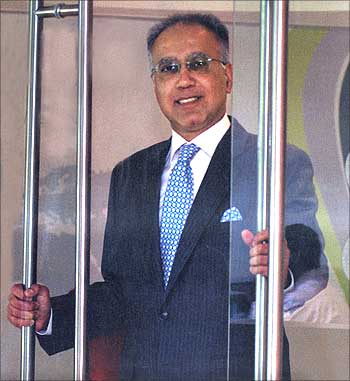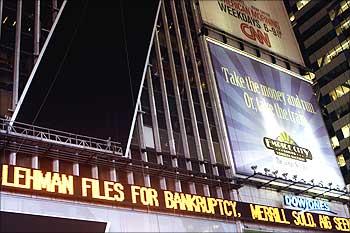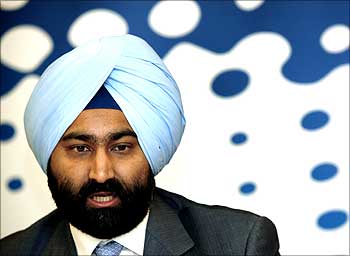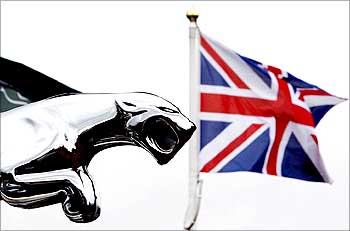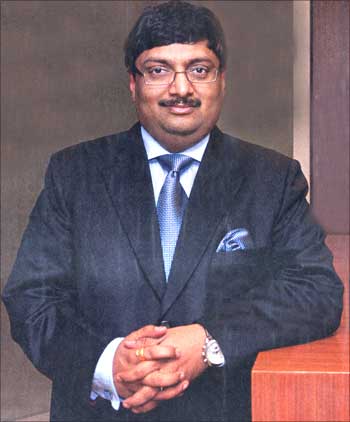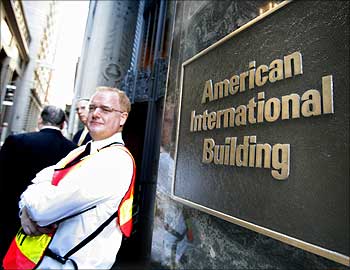 | « Back to article | Print this article |
How Religare aims to rule financial services world
Some time in 2001, brothers Malvinder and Shivinder Mohan Singh decided that they need to grow their financial services business.
The family had acquired a non-banking finance company called Empire Capital and renamed it Fortis Securities. It was a small company. Their first job was to find somebody to run it.
They approached Sunil Godhwani. He came from a wealthy family of leather exporters. Like the Singh brothers, he was a follower of the Radhasoami Satsang.
The Godhwanis' association with the Singh family went back two generations. Only, he knew little about financial services and lesser still about stock markets. Still, he agreed to come on board from August 1, 2001. Godhwani was given a small office at Connaught Place to lead a team of 19. His desk was brought on a pushcart from the furniture market close by.
Eight years later, the company has been renamed Religare Enterprises ("Religare" is Latin for religion or values that bind people together; the brand is owned by the Singhs) to avoid any conflict of identity with the financial powerhouse headquartered in Belgium and the Netherlands, and its headquarters has moved to two huge offices in South Delhi and Noida spread over 750,000 square feet.
Senior managers all drive around in Mercs. It has done three acquisitions in India and abroad. More important, Godhwani wants to make Religare one of the top five global names in financial services "much sooner than others think."
How Religare aims to rule financial services world
In the past, Malvinder Singh would often talk of taking Religare to the same heights as Merrill Lynch. The financial meltdown of 2008 that saw the collapse of venerated names like Lehman Brothers, Goldman Sachs and Merrill Lynch may have made Singh and Godhwani rephrase the target, but the ambition of global scale in double-quick time remains intact.
"There is nobody Indian in that space," says Godhwani, the tough-talking managing director and CEO of Religare. That it took Goldman Sachs and Merrill Lynch decades to build scale and only days to perish doesn't seem to deter him.
Religare has moved in several directions in the recent past. It has built a retail network in 537 Indian cities and towns. From close to 2,000 offices, it sells stock and commodity brokerage services, life insurance and mutual funds.
It gives personal loans against shares and property. It also runs an education and healthcare fund with Milestone, has a life insurance venture with Aegon, finances film and operates an art fund. Retail still accounts for about half of its business (2009-10 revenue is projected at around Rs 1,400 crore -- Rs 14 billion).
At 10 to 11 per cent, the profit margins in retail are not bad. And the net interest margin in personal loans is around 5 per cent (loan book size as on September 30 is Rs 850 crore (Rs 8.50 billion); Godhwani wants to grow it to Rs 10,000 crore (Rs 100 billion) in three to five years).
Yet this is not good enough for the Singh brothers and Godhwani. (The three together form the Promoters' Council which decides unanimously on broad strategic issues). They want to spread their wings quickly across the globe.
How Religare aims to rule financial services world
Though Godhwani insists that the umbilical chord with Ranbaxy has been cut forever, the similarity with India's largest pharmaceutical company under the Singhs is unmistakable. (Malvinder Singh ran the company till recently, Shivinder Singh and Godhwani served on the board of directors.)
Ranbaxy, during that period, did a series of acquisitions abroad to gain size and hedge its risks against the worsening US market. The growth areas they have identified for Religare are investment banking and asset management.
Investment banking
Religare has engaged McKinsey to help it build an emerging market investment bank. The reason for the thrust is not hard to find. Fees charged by investment banks can range anywhere between two per cent and three per cent of the deal size.
Even in a bad year like 2009, mergers and acquisitions worth $7.6 billion were done in the country till October, according to Grant Thornton. (The deal market was $27.2 billion in 2008 and $38 billion in 2007.)
This means that investment banks will rake in at least $150 million during the year from India alone. The global pie will be much bigger. It is a part of this action that Religare wants to chase.
"The idea," says Religare Chief Operating Officer Shachindra Nath, "is to act as a bridge between the developed world and the emerging economies."
How Religare aims to rule financial services world
Corporations in the US and Europe want to expand in high-growth economies like India and China. At the same time, Indian and Chinese businessmen, made rich by the recent stock market surges, are keen to buy assets abroad. The Tatas have bought, amongst others, Corus and Jaguar-Land Rover. The Aditya Birla Group bought Novelis of Canada. Reliance Industries wants to acquire Dutch firm LyondellBassell. Each deal runs into billions of dollars.
To begin with, Religare in May 2008 acquired Hichens Harrison, London's oldest brokerage firm for Rs 450 crore (Rs 4.50 billion). It came with an investment banking licence not just in London but also important markets like Johannesburg and West Asia.
Religare has made London, the world's financial nerve centre, its headquarters for investment banking. It has appointed Martin Newson, who has in the past worked with Dresdner, Deutsche Bank and CSFB, as the head of its investment bank on a salary that exceeds Godhwani's.
The team that was inherited from Hichens Harrison has been expanded from about 30 to 70. Capabilities are being built in areas like real estate (Hichens Harrison is a broker on London's Alternative Investment Market, a popular destination for real estate developers), financial services, mines and minerals and healthcare.
For healthcare, Religare has appointed on the Hichens Harrison board Brian Tempest, a former CEO of Ranbaxy. Tempest has dealt for long with pharmaceutical companies in Europe. It has also applied for a full-fledged licence from the US regulators.
Meanwhile, Religare has set up a representative office there.
How Religare aims to rule financial services world
That pretty much ties up the developed markets. Amongst the emerging markets, Religare has on its list of priority, apart from China and India, Hong Kong, Singapore, Indonesia and Malaysia.
In all these markets, it will set up shop on its own, except China where it has no option but to go with a local partner. In the smaller markets, Religare, says Nath, could go with a partner or take a small stake in a local firm.
"In Vietnam, for instance," says he, "there is not much business now, but it could pick up in the future. So, we will buy 10 to 20 per cent in a local investment bank."
The grand plans may be fine, critics say, but Religare has not had much to show so far. The two big deals it talks about -- Daiichi's acquisition of Ranbaxy and Fortis' acquisition of Wockhardt Hospitals -- were, after all, house deals.
The Ranbaxy transaction involved the Singh brothers selling their stake and Fortis too is their company. Godhwani refutes the charge that the two deals came to Religare on a platter.
"There were others also in the race for both of these transactions. These came to us at the end after they had looked around for a while," says he. To prove his point, Godhwani discloses that bigger deals than these two are in the works and can be expected to make headlines soon.
How Religare aims to rule financial services world
Asset management
Religare's philosophy for asset management is not very different: Channel money from developed markets to emerging markets. There are, says Nath, three pockets of capital in the world: The US which accounts for 60 per cent of world capital, West Asia and Japan.
The big thing here will be fund of funds -- these do not invest in companies directly but in various other funds. Religare feels that Asia is under-represented in fund of funds. It has got on board a consultant (one of the big five) to devise a fund-of-funds strategy. Meanwhile, Religare has acquired the management team of Evolvence, an India-focused fund of funds with a corpus of $250 million.
It has done something similar in Japan -- it has bought the team and asset-management contract of a European asset management company. The details of the deal are still under wraps.
Religare, according to Nath, is now in the process of putting together a team for China, the El Dorado of private equity. The private equity deals, Religare hopes, will also fetch it more investment banking business.
Religare clearly wants to gain critical mass in asset management through acquisitions. It was in the race to acquire AIG Investments of the US, which has assets worth $115 billion under management.
The deal was finally clinched by Richard Li. Religare has now appointed Mathew Mongia, earlier of private equity fund Vishwas Capital and hedge fund Monsoon Capital, to scout for asset management companies in the US. And what is the war chest? "We were ready to pay in the range of $400 million for AIG Investments. We can go beyond that," says Nath.
How Religare aims to rule financial services world
The other part of asset management is mutual funds. In India, Religare acquired Lotus India Asset Management Company in November 2008. As a result, the proposed asset management joint venture with Aegon has been called off.
The asset management licence Religare had acquired has been turned over to Aegon. The assets under management at Lotus, now called Religare Asset Management Company, have in the last one year jumped from Rs 3,000 crore (Rs 30 billion) to over Rs 17,000 crore (Rs 170 billion).
Back home
Observers and analysts say that Religare needs to build scale in the country before venturing abroad. "Only then will you have a convincing story to tell," says the India representative of a global fund house.
Religare has so far been able to attain scale in India only in the securities business. In equity trading, its market share stood at 4.13 per cent in September 2009, and in online trading it was 8.28 per cent in August 2009.
The corpus of its mutual fund is around two per cent of the industry total, the size of its retail loan book is smaller than that of rivals like Bajaj Finance, and it is a fringe player in the home finance market (it had acquired Maharishi Home Finance some time ago in a small deal and re-capitalised it with Rs 100 crore -- Rs 1 billion --; the book size is just Rs 60 crore -- Rs 6 billion).
In addition, its life insurance venture with Aegon is still small. So much so, four years after it started, Religare Aegon has now hired The Boston Consultancy Group to review its ten-year strategic plan. "We know that the Religare distribution network will not work for life insurance. We need to rethink it. ICICI Prudential has one million feet on the streets, while Religare Aegon has only 1,500 people," says Nath.
How Religare aims to rule financial services world
Sector experts also say that there is a need for Religare to relook at its retail network. It has about 500 branches of its own and around 1,200 franchisees across the country. The company-owned branches account for 80 per cent of the business. Moving forward, Godhwani says, Religare will consolidate its infrastructure in most cities.
Still others suggest Religare needs to tap high net worth customers through its network. For that, the company has formed a venture with Macquarie. "We want to touch the client in a full 360-degree way," says Godhwani.
Adequate resources
Most important, say critics, Religare needs to build a team and needs to be adequately capitalised if it wants to go global.
Its share capital along with reserves and surplus stands at Rs 2,603 crore (Rs 26.03 billion). The Singhs, who made close to Rs 10,000 crore (Rs 100 billion) from the sale of their Ranbaxy shares, have a stake of 55 per cent.
But they have underwritten the entire rights issue -- Rs 1,800 crore (Rs 18 billion) is already in the bank. If it devolves, their stake will rise to 73 per cent. Analysts say Religare is one of the best capitalised companies in the sector today. In addition, the Singh brothers have invested Rs 30 crore (Rs 300 million) in the healthcare and education fund with Milestone. They could invest in other funds also in the future.
So far as people are concerned, Godhwani says his top priority is to get the right person for the right job.
How Religare aims to rule financial services world
"The anchor (for an employee) in financial services is either money or relationship. That is where I come in. As the CEO, I am the chief ego organiser and the chief event organiser. That's why I have got ten people more intelligent than me," says he.
"I run the company like I own it. I have passed on this empowerment to my CEOs. It is the Religare virus."
Godhwani clearly understands that he needs good people to stay for long. He plans to give most senior employees stock options -- all businesses have therefore been kept in separate subsidiaries.
This means that several of these subsidiaries will get listed on the stock exchange. Option-holders in unlisted companies may be compensated with Religare shares or even cash -- the details are being worked out by human resources consultancy Mercer.
Will it be good enough to help Religare reach where no Indian has gone before? Wait and watch.
